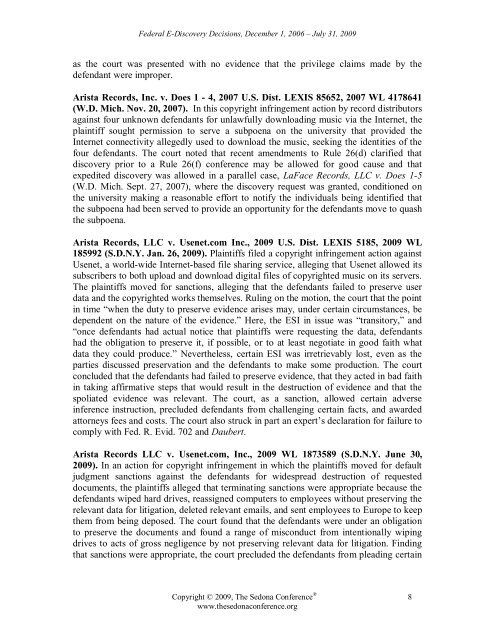Federal Court Decisions Involving Electronic Discovery, December 1 ...
Federal Court Decisions Involving Electronic Discovery, December 1 ...
Federal Court Decisions Involving Electronic Discovery, December 1 ...
You also want an ePaper? Increase the reach of your titles
YUMPU automatically turns print PDFs into web optimized ePapers that Google loves.
<strong>Federal</strong> E-<strong>Discovery</strong> <strong>Decisions</strong>, <strong>December</strong> 1, 2006 – July 31, 2009<br />
as the court was presented with no evidence that the privilege claims made by the<br />
defendant were improper.<br />
Arista Records, Inc. v. Does 1 - 4, 2007 U.S. Dist. LEXIS 85652, 2007 WL 4178641<br />
(W.D. Mich. Nov. 20, 2007). In this copyright infringement action by record distributors<br />
against four unknown defendants for unlawfully downloading music via the Internet, the<br />
plaintiff sought permission to serve a subpoena on the university that provided the<br />
Internet connectivity allegedly used to download the music, seeking the identities of the<br />
four defendants. The court noted that recent amendments to Rule 26(d) clarified that<br />
discovery prior to a Rule 26(f) conference may be allowed for good cause and that<br />
expedited discovery was allowed in a parallel case, LaFace Records, LLC v. Does 1-5<br />
(W.D. Mich. Sept. 27, 2007), where the discovery request was granted, conditioned on<br />
the university making a reasonable effort to notify the individuals being identified that<br />
the subpoena had been served to provide an opportunity for the defendants move to quash<br />
the subpoena.<br />
Arista Records, LLC v. Usenet.com Inc., 2009 U.S. Dist. LEXIS 5185, 2009 WL<br />
185992 (S.D.N.Y. Jan. 26, 2009). Plaintiffs filed a copyright infringement action against<br />
Usenet, a world-wide Internet-based file sharing service, alleging that Usenet allowed its<br />
subscribers to both upload and download digital files of copyrighted music on its servers.<br />
The plaintiffs moved for sanctions, alleging that the defendants failed to preserve user<br />
data and the copyrighted works themselves. Ruling on the motion, the court that the point<br />
in time “when the duty to preserve evidence arises may, under certain circumstances, be<br />
dependent on the nature of the evidence.” Here, the ESI in issue was “transitory,” and<br />
“once defendants had actual notice that plaintiffs were requesting the data, defendants<br />
had the obligation to preserve it, if possible, or to at least negotiate in good faith what<br />
data they could produce.” Nevertheless, certain ESI was irretrievably lost, even as the<br />
parties discussed preservation and the defendants to make some production. The court<br />
concluded that the defendants had failed to preserve evidence, that they acted in bad faith<br />
in taking affirmative steps that would result in the destruction of evidence and that the<br />
spoliated evidence was relevant. The court, as a sanction, allowed certain adverse<br />
inference instruction, precluded defendants from challenging certain facts, and awarded<br />
attorneys fees and costs. The court also struck in part an expert’s declaration for failure to<br />
comply with Fed. R. Evid. 702 and Daubert.<br />
Arista Records LLC v. Usenet.com, Inc., 2009 WL 1873589 (S.D.N.Y. June 30,<br />
2009). In an action for copyright infringement in which the plaintiffs moved for default<br />
judgment sanctions against the defendants for widespread destruction of requested<br />
documents, the plaintiffs alleged that terminating sanctions were appropriate because the<br />
defendants wiped hard drives, reassigned computers to employees without preserving the<br />
relevant data for litigation, deleted relevant emails, and sent employees to Europe to keep<br />
them from being deposed. The court found that the defendants were under an obligation<br />
to preserve the documents and found a range of misconduct from intentionally wiping<br />
drives to acts of gross negligence by not preserving relevant data for litigation. Finding<br />
that sanctions were appropriate, the court precluded the defendants from pleading certain<br />
Copyright © 2009, The Sedona Conference ® 8<br />
www.thesedonaconference.org
















